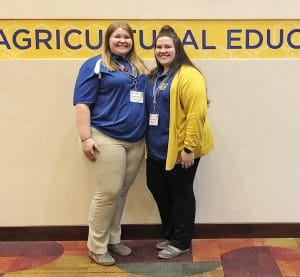Emma Reed and Morgan Seymore were honored with the selection to serve as volunteers for the Educational Development & Evaluation Team during the 2019 National FFA Convention. Only 20 students were chosen from across the United States to serve in this leadership role. As future agricultural educators, this service will provide them with countless learning opportunities.
Reed is a senior Agricultural Education major from Rose Bud, Arkansas. Seymore is a junior Agricultural Education major from Hickory Plains, Arkansas. Both grew up on farms and were thrilled to be chosen as volunteers.
“I grew up surrounded by agriculture,” Reed said. “Some of my best childhood memories come from jumping through a hay barn, taking care of my many ducks and rabbits, and sneaking baby chicks into elementary school.” Her love for agriculture was bolstered when she was asked to join the FFA program in high school. “Before the first day of school, I had already been recruited to compete in one of my chapter’s Career Development Event teams,” she said. “It didn’t take long for me to make FFA the base of my high school career.”
Seymore grew up on a family farm outside Beebe. “My grandparents started a small cow/calf operation along with bailing hay in the 1950s,” she said. “Over the years, my uncles took over and started crop rotation between corn and sorghum. When we planted corn, the whole family would be out shucking buckets of corn after it was harvested and then divide between the families. When we harvested sorghum, it was also a big event. I loved helping during the harvest and seeing a plant turn into this syrupy goodness.”
In high school, Reed began competing for her FFA chapter’s Floriculture CDE team. From learning how to make all types of floral arrangements, to solving situations that can arise in any aspect of the floral industry, her team placed first in state competition and earned a trip to Nationals. “This fueled my drive to be more active in FFA,” Reed said.
Seymore has been active in FFA five years, starting in ninth grade. In addition to her classwork, she was involved on such leadership teams as Opening and Closing Ceremonies and Parliamentary Procedures. She also served on the Poultry Evaluation Team, sharing her knowledge of the poultry industry at schools across Arkansas. She showed pigs in her junior and senior high school years and participated in numerous community service projects.
For Reed, choosing SAU to call home was an easy decision. She transferred to SAU after receiving her associate degree from Arkansas State University-Beebe, having been impressed with the campus on her first tour. “I fell in love with SAU,” she said. “I was greeted with smiles and countless testimonies as to why SAU was a great option. I’m very thankful I chose SAU. I’m blessed to have formed relationships with such great advisors, employers, and friends.”
Seymore also formed an attachment to SAU after her first tour. “At SAU, it felt like I could talk to anyone if I had a problem or just felt homesick,” she said. “Even though I am three hours from my actual home, SAU definitely feels like my home away from home.”
This year, 70,000 FFA members attended the National Convention and Expo, coming from all over the United States, Puerto Rico and the Virgin Islands. “Getting chosen as a volunteer consisted of answering written questions relating to our experiences, interactions with students, and what we hoped to gain,” Reed said. Telephone conference interviews followed in the second part. “Then came waiting to hear whether we were going to be one of the 20 who would make the Educational Development and Evaluation Team,” she said.
After receiving their congratulatory emails, Reed and Seymore traveled to Indianapolis, where they immediately reported to work. “During the Convention, our team was tasked with working in National FFA’s new Ag Experience booth,” explained Reed. “It allows students to walk through 7,000 interactive square feet, learning and experiencing the history of National FFA.”
A few of their duties included assisting guests and members in working their way around the booth, communicating FFA history and discussing students’ personal interests within FFA.
“We had four different sections that would rotate groups every so often,” Seymore said. One interesting feature was the “50 Years of Women in Agriculture” timeline as well as four different types of FFA jackets in rotating glass cases.
Seymore gained valuable experience she can use in the classroom and more knowledge about the agriculture industry. “I’ll be able to incorporate this knowledge into my own personal and professional life,” she said.
Working the volunteer booth offered Reed an amazing chance to “talk to individuals with different ethnicities, backgrounds and interests.” She came away from the National Convention “with a lot learned and gained. I’m more confident in my ability to interact with diverse students. It has reinstated my will to become a future FFA advisor.”

